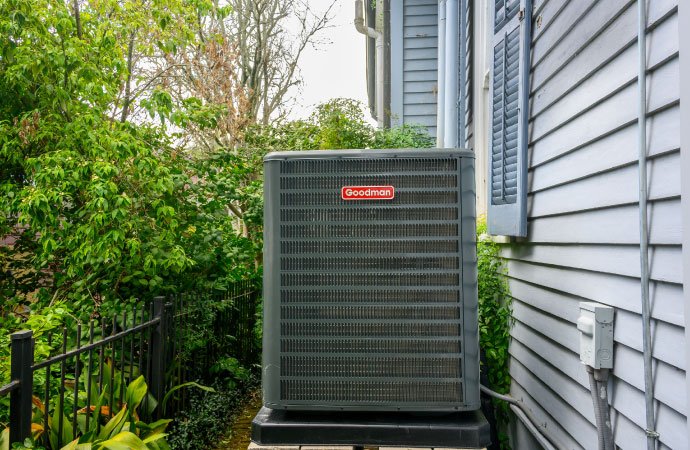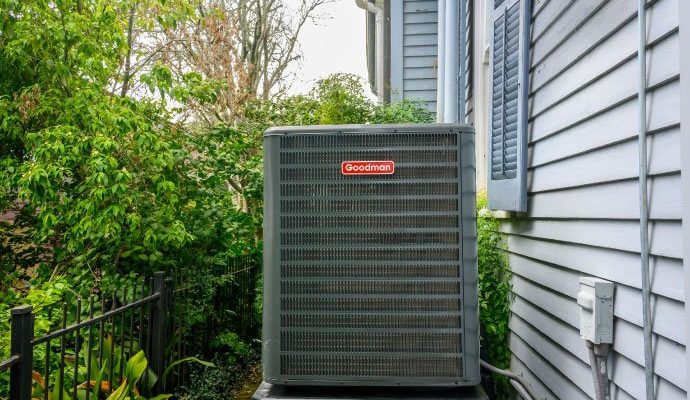
Honestly, the details can get a little fuzzy, especially when it comes to warranties, serial numbers, and the idea of *ownership* when it’s not technically your equipment. Goodman, a major brand in heating and cooling, prides itself on solid warranties—but the process of getting those benefits often depends on who actually owns the system.
Let me explain how this works, what tenants can and can’t do when it comes to registering a Goodman HVAC system, and what the process means for both you and your landlord. We’ll break it all down together, step by step, so you don’t get stuck in a loop of paperwork, phone calls, or awkward conversations.
How Goodman HVAC Registration Works
Before we talk about tenants and landlords, let’s start with registration basics—what is it, and why does it matter? When a new Goodman HVAC system is installed, the manufacturer offers a warranty, often with an “extended” option if the product is registered online within a certain window (usually 60 days). Registering the system means providing the serial number, installation date, and details about the *owner*.
Here’s the thing: this process is like syncing your new phone for the first time. You punch in the model, maybe set up a code, and tell the system who’s running the show. The registration tells Goodman who’s responsible—and who can claim the warranty if the system needs a reset or major troubleshooting later.
Most of the time, registration goes through Goodman’s website or a mailed form. It’s not complicated, but it’s designed for whoever purchased or *owns* the system. This is important, because the owner—not just the resident—gets linked to any warranty claims down the road.
Who Can Legally Register a Goodman HVAC System?
Let’s cut to the chase: Goodman expects the *owner* of the property—or whoever purchased the HVAC system—to handle registration. Think of it like registering a car or setting up a bank account. Because the system is a permanent fixture in the home, the legal owner (almost always the landlord in a rental property) needs to be on the paperwork.
If you’re the tenant, you usually *cannot* register the Goodman HVAC system in your own name—even if you’re the one using it, adjusting the remote, or changing the battery. Goodman’s system doesn’t allow registration by anyone who can’t prove ownership or isn’t tied to the property’s deed.
– The landlord typically keeps the purchase receipt and installation code.
– Building management or a property owner might handle any syncing or pairing with the manufacturer.
– If you try to register it yourself, Goodman may reject it or request proof you actually own the place.
This isn’t Goodman being picky; it’s a legal thing. Warranties are tied to the system’s owner and property address, not the current occupant.
Why HVAC Registration Matters for Tenants
So, if tenants can’t register Goodman HVAC systems, does it even matter to you? Actually, yes! Here’s why: a registered system means the warranty—especially the extended type—will cover expensive repairs or part replacements. If the landlord skips this step, any future reset, code error, or deep troubleshooting might come out of their (or your) pocket.
Imagine your HVAC stops working in the middle of a summer heatwave. If the system’s not registered, Goodman may only offer the most basic coverage. That leaves the landlord stuck with higher costs. Landlords who are on top of registration protect both themselves and their tenants from these surprise bills.
If you’re a tenant moving in to a place with a new Goodman system, it’s worth asking:
- “Did you register the HVAC with Goodman?”
- “Is the warranty still active?”
- “Who do I call if there’s a problem—do you handle warranty claims?”
Staying curious now can save a lot of hassle later on.
Steps a Tenant Can Take If the Goodman HVAC Isn’t Registered
You might be wondering, “Okay, but what if my landlord didn’t register the Goodman HVAC and now we’re out of time?” That’s a tricky spot—sort of like realizing you forgot to sync your TV remote before losing the manual.
Here’s what you can do:
- Ask the landlord to register it ASAP. If you’re still within the window (often 60 days post-install), nudge the property owner politely. Sometimes they just forget.
- Offer to help with the process. You could volunteer to gather details (serial number, installation date, installer info) and fill out the registration on their behalf, but it still needs to be in their name.
- Document your requests. Keep emails or texts handy, just in case you ever need backup for future repairs.
- If out of time, ask about alternate warranties. Some systems default to a shorter standard warranty if not registered, so check with Goodman or the installer about what coverage remains.
Never try to “fake” registration info. If Goodman discovers a tenant registered a landlord’s unit, they may void the warranty completely, leaving everyone stuck.
Landlord Rights vs Tenant Rights With HVAC Warranties
Heating and cooling systems live in this strange in-between space—tenants use them, but landlords technically own and control them. When it comes to Goodman HVAC systems, the legal rights are usually pretty clear: the *owner* gets warranty benefits, not the tenant.
For landlords:
- Registering is their responsibility. They’ll need to do it within the allowed timeline, using the correct address and ownership details.
- Making a claim is their job. If something breaks, the landlord is the one who can call Goodman, use the warranty, or authorize repairs.
For tenants:
- You benefit indirectly. A registered system means faster, cheaper fixes if anything goes wrong.
- You’re not on the hook for registration, but you should keep the landlord informed about any issues—strange noises, error codes, or performance quirks.
Remember, you have the right to a working HVAC system as part of “habitability” laws. If things break and the landlord hasn’t registered the unit, they’re still responsible for repairs—it just might cost them more.
How Goodman Handles System Transfer or Sale
What if you started as a tenant, but wound up buying the property (or subletting it)? Can you transfer Goodman’s registration or warranty? The answer is a qualified “yes, but…” depending on the situation.
Goodman’s warranty can usually transfer to a new owner, as long as:
- The system stays at the original address. If it’s moved, all bets are off.
- The new owner updates the registration with proof of property transfer.
However, *tenants* don’t qualify for a warranty transfer unless they buy the building. If you’re just moving in or out, the warranty sticks with the property and its legal owner—not the resident. This is another reason why it’s so important for landlords to handle registration correctly from day one.
Common Troubleshooting Tenants Can Do (Without Voiding Warranty)
Even if you can’t register the Goodman HVAC system yourself, you’re probably still the first to notice when something feels off—like weird noises, stubborn remotes, or a blinking code on the control panel.
Here’s what you can safely do as a tenant:
- Replace easy parts. Swapping out the remote batteries or resetting the thermostat are usually fair game.
- Basic troubleshooting. Goodman encourages users to check for tripped breakers, dirty filters, or obvious blockages before calling for service.
- Document issues. Take pictures of any error codes, flashes, or alarms so the landlord or service tech has a head start.
Important: Don’t open up the main unit, fiddle with wiring, or try to reset the system at a deep technical level. That could void the warranty and get you (and your landlord) in hot water.
If something’s not right, let the landlord know right away. They’re the ones who will sync up with Goodman, schedule repairs, or file warranty claims.
Alternatives for Tenants: Portable and Universal Options
Maybe you’re reading this and thinking, “Geez, this sounds complicated. Why can’t I just use my own system?” Some tenants in older homes or apartments turn to portable ACs, window units, or even universal remotes for better control.
A few alternatives:
- Portable AC/heater units. You can buy, own, and register these yourself—no landlord needed. Just check your lease before installing anything permanent.
- Universal HVAC remotes. If the main remote is lost or dead, some universal options work with Goodman units. You’ll still want the landlord’s okay to pair or sync a new remote.
- Ask about programmable thermostats. Sometimes landlords will install these for added comfort and remote control, letting you adjust settings without touching the main system.
But for the central Goodman HVAC system, the official warranty registration still has to go through the property owner.
Final Thoughts: Set Expectations and Stay Connected
Living with a Goodman HVAC system as a tenant can feel like riding shotgun in a new car—you’re along for the experience, but you’re not steering the paperwork. While you can’t register the system yourself, staying proactive, informed, and communicative with your landlord is the best way to make sure you’re comfortable and protected.
Don’t be shy about asking for details on the system’s registration, warranty, or troubleshooting process. It’s your home, after all, even if the HVAC belongs to someone else. Keeping everyone in the loop—landlord, installer, tenant—means fewer surprises when it’s time to reset, repair, or just enjoy a cool breeze on a hot afternoon.
